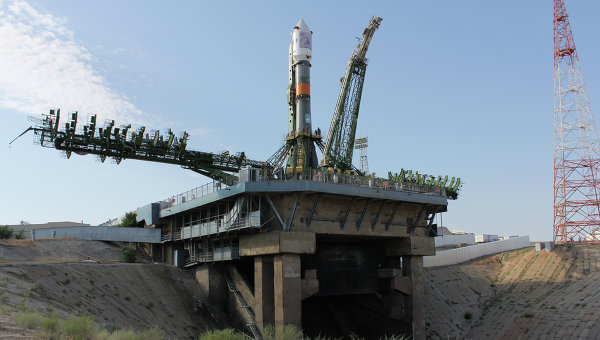
 Russia’s Soyuz-FG carrier rocket with a group of five satellites on board will blast off from the Baikonur space center in Kazakhstan early on Sunday, a spokesman for the Russian space agency Roscosmos said.
Russia’s Soyuz-FG carrier rocket with a group of five satellites on board will blast off from the Baikonur space center in Kazakhstan early on Sunday, a spokesman for the Russian space agency Roscosmos said.
“The launch of the Soyuz-FG rocket is scheduled for 10:41 am Moscow time (06:41 GMT),” the spokesman said.
The rocket will deliver the Russian satellites Canopus-B and MKA-PN1, a Belarusian BKA satellite, the Canadian ADS-1B and German TET-1 into orbit.
The Fregat space tug is expected to separate from the rocket nine minutes after the launch, the spokesman said.
The five satellites were initially planned to be launched in the first half of 2012, but the mission was postponed several times because Kazakhstan dragged on the decision on Russia's use of its territory as a drop zone for the first stage of the Soyuz rocket.
Kazakhstan gave a permit to Russia for the unplanned launch of the space vehicles from the Baikonur space center following a meeting between Kazakh Prime Minister Karim Massimov with his Russian counterpart Dmitry Medvedev in mid-June.
The Canopus-B satellite, developed by the All-Russia Research Institute of Electromechanics (NPP VNIIEM), is designed for remote sensing of the Earth. It weighs about 400 kilograms and it is to work on a circular orbit at a height of 510 km.
The BKA satellite is a Belarusian analogue of the Canopus-B.
The MKA-PN1 satellite is designed to collect data that would help meteorologists to build models of ocean circulation (particularly in Arctic waters along Russian shores) and climate dynamics. The satellite was developed by Russia’s NPO Lavochkin aerospace company.
The German TET-1 satellite will be launched as part of the German Aerospace Center’s On-Orbit Verification Program (OOV) aimed at testing new space technologies.
The ADS-1B satellite will form part of a ship-identification satellite system developed by the Ontario-based Com Dev aerospace company.

 Previous page
Previous page Back to top
Back to top







